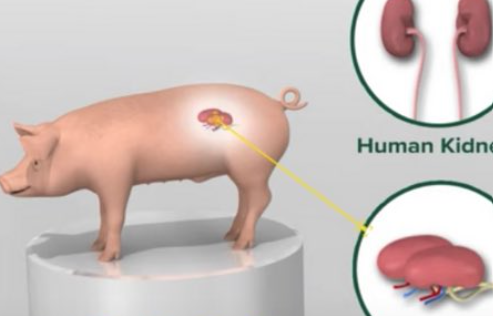In the Blue Ridge mountains, a unique research farm is raising what could be the future of organ transplantation – genetically modified pigs bred to provide kidneys and hearts for human use. This project, led by Revivicor Inc., involves stringent biosecurity measures to ensure the pigs remain free from contaminants. The process includes washing down vehicles, changing into medical scrubs, and disinfecting boots before entering the facility, which is akin to a pharmaceutical plant more than a traditional farm.
David Ayares of Revivicor Inc. highlights the importance of these pigs, stating they are “precious animals” that have been genetically engineered to potentially serve as a reliable source of organs for transplants. The company has spent decades perfecting the cloning and genetic modification processes necessary for these groundbreaking experiments.
Adventures of Super Clean Piggies Getting Ready for Big Heart Missions
Some of the world’s cleanest pigs are being raised in the Virginia mountains to supply kidneys and hearts for animal-to-human organ transplants. https://t.co/WQYJ9Ta45d
— The Newborn Times (@thenewborntimes) July 22, 2024
The biosecurity protocols become even more intense at another facility in Christiansburg, Virginia. Here, pigs are raised in an environment with filtered air and water and disinfected feed to ensure they remain as clean as possible. This new $75 million facility meets the FDA’s stringent safety standards for xenotransplantation, the process of transplanting animal organs into humans.
Each stage of the pig breeding process is meticulously controlled. The journey begins with modifying pig genes in a lab, followed by cloning the altered pigs. Scientists use a technique that involves replacing the pig’s maternal DNA with genetic modifications under a microscope. This intricate process is likened to playing two video games simultaneously. Once embryos are successfully altered, they are implanted into sows on the research farm.
The pigs at these facilities are not just kept clean but also entertained with music and toys, acknowledging their intelligence and the significant role they play in advancing medical science. Currently, about 300 pigs live on the research farm, each tagged with identifiers for their genetic modifications.
In the first procedure of its kind, a 54-year-old New Jersey woman received a genetically engineered pig kidney and thymus after getting a heart pump. Support Us: https://t.co/KZfMloJWDr #ainews #technews #ai https://t.co/Q69Fly0xxb
— Swanky View (@SwankyView) July 19, 2024
The goal is to address the severe shortage of human organs for transplants. Thousands of Americans die each year waiting for organ transplants, and genetically modified pigs offer a potential solution. Four “compassionate use” transplants have already been performed in the U.S., providing valuable lessons despite the patients’ eventual deaths.
As the FDA evaluates these initial successes and additional studies involving pig organs in baboons, United Therapeutics plans to scale up production. Their new pathogen-free facility in Christiansburg is expected to produce about 125 pig organs annually, enough for clinical trials. If successful, larger facilities could follow, capable of producing up to 2,000 organs a year.
Key Points:
- Revivicor Inc. is raising genetically modified pigs in highly controlled environments to potentially provide organs for human transplants.
- The pigs are bred and maintained in a $75 million pathogen-free facility that meets FDA safety standards.
- The process involves complex genetic modifications and cloning to produce pigs with organs less likely to be rejected by human bodies.
- About 300 pigs are currently part of the project, with the potential to produce 125 organs annually for clinical trials.
- If successful, the project could lead to larger facilities capable of producing up to 2,000 organs per year, addressing the critical shortage of human organs for transplantation.
Kirk Volo – Reprinted with permission of Whatfinger News



